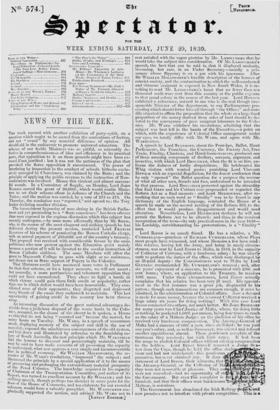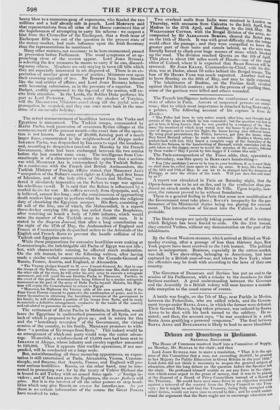NEWS OF THE WEEK.
THE week opened with another exhibition of party-spirit, on a question which ought to be sacred from the contentions of fhction, and not " vexed" by any material difference of opinion. All should aid in the endeavour to promote universal education. The scheme of our feeble Ministers was so pitiful, so miserably de- fective in comprehensiveness of idea and efficiency in its practical parts, that opposition to it on those grounds might have been ex- cused if not justified : but it was not the pettiness of the plan that provoked the fierce opposition it encountered. The power of interfering by inspection in the conduct of schools hitherto exclu- sively managed by Churchmen, was claimed by the State; and the principle of applyingthe public revenue to the instruction of Non- conformists was involved. Hence this virulent and almost success- ful assault. In a Committee of Supply, on Monday, Lord ;Ions RUSSELL moved the grant of 30,0001., which would enable Minis- ters to set their scheme afloat in defiance of the Church and the Tories ;- and the motion was carried, by a vote of 275 to 273. On Thursday, the resolution was "reported," and agreed to; the Tory leader declining another division.
The inconsistent hypocrisy of men sitting in the British Parliat- meat and yet pretending to a " State conscience," has been oftener than once exposed in the copious discussion which this subject has recently undergone,—by none more effectually than by Mr. Sum, who, in the course of the most eloquent and striking speech he has delivered during the present session, reminded -Lord FRANCIS Famnrox of his scheme of pensioning the Roman Catholic clergy, with an annual payment of 250,000/. out of the country's treasury. That proposal was received with considerable favour by the same politicians who now protest against the Education grant inanity because a portion of it will be devoted to the secular instruction of Roman Catholic children. The same Members will allow the grant to Maynooth College to pass with slight or no resistance, and demur not to State support of Popery ill the Colonies. That Ministers could have mustered more votes in Parliament for their first scheme, or for at larger measure, we will not assert ; but assuredly, a more pertinacious and vehement opposition they could not have encountered. They chose to tight a battle in which victory could gain them little credit or popularity, rather than one in which defeat would have been honourable. They con- ciliated none of their opponents ; they disgusted and depressed many friends of the cause they undertook to maintain. This last opportunity of gaining credit in the country has been thrown away.
An interesting discussion of the great national advantages de- rivable from a Judicious disposal of the waste lands in the Colo- nies, occupied, to the shame of the absent be it spoken, a House so,thin that its not being " counted out " became the marvel, for many hours on Tuesday-. Mr. WARD, in a speech of uncommon merit, displaying mastery of the subject and skill in the use of materials, exposed the mischievous consequences of the old system, and laid down and illustrated by reference to the flourishing co- lony of South Australia, the new principle which Mr. WAKEFIELD had the honour to discover and perseveringly maintain, till he may he said to have made converts of all possessing the capacity to understand, what now appears a very simple and incontrovertible fact in political economy. Sir WILLIAM MOLESWORT1L, the se- condo. of Mr. Wann's resolutions, " improved" the subject ; and Illustrated the principle by a special application of it to the means Of preserving and prolonging the extraordinary material prosperity of the Penal Colonies. The knowledge acquired in his capacity of Chairman of the Transportation Committee, and author of' its Report, was turned to excellent account by Sir WILLIAM ; and his striking speech, though perhaps too abstract in some parts for the floor of the House of' Commons, and too elaborate for our crowded columns, would form a valuable pamphlet. Mr. WAnitmeroN em- phatically supported the motion, and advised Mr. WARD not to
[LATEST EDITION.] rest satisfied with the vague 'atomise by Mr. LABOUCHRUE that he would take the subject into consideration. Of Mr. Lanoucannas speech, the best that can be said is, that it displayed modesty, becoming, but rare, in an Under Secretary—usually a per- sonage whose flippancy is on a par with his ignorance. After Sir WILLIAM Mor.Eswowrit's forcible description of the horrors of convict society, and the contamination to which the well-conducted and virtuous emigrant is exposed in New South Wales, it is re- volting to read Mr. LABOUCIIERE'S boast that DO fewer than ten thousand souls were sent from this country at the public expense to that penal colony in the course of the last year. Lord Howicit exhibited a reluctance, natural in one who is the real though irre- sponsible N mister of the department, to any Parliamentary pro- ceeding which should fetter hint:elf through " the Office ;" and stur- dily objected to affirm the proposition that the whole or a large fixed proportion of' the money derived front sales of land should be de- voted to the conveyance of poor emigrant labourers to the Colo- nies. 111r. WARD withdrew his restitutions, admitting that the subject W/IS best left in the hands of the Executive,—a point on which, with the experience of Colonial Office management under our eyes, we totally differ with Mr. WARD, and agree with Mr. WARBURTON.
A speech by Lord STANHOPE, about the Poor-law, Ballot, Short Parliaments, the Franchise, the Currency, the Factory Act, Free Trade, Finality, Chartists, and Hand-loom-weavers, produced one of those amusing compounds of drollery, sarcasm, argument, and. invective, with which Lord BaouonAnt, when the fit is on him, en- livens the dulness of lordly disquisitions. He belaboured his Whig victims with wonted gusto; punishing Lord Viscount Howtcx with an especial flagellation, for the honest confession that he only "opened" the Boat question for a purpose the reverse of what all other men, friends and foes, understood to be intended by that process. Lord BROUGHAM protested against the absurdity that Earl GREY and his Cabinet ever propounded or regarded the Reform Act as a final measure : and Lord MELBOURNE, after re- marking that no such word as " finality" was to be found in any dictionary of the English language, reminded the House of a speech he made on the second reading of the Reform Bill, to the effect that it would produce disappointment and would need alteration. Nevertheless, Lord Mimuounxis declares he will not permit the Reform Act to be altered; and thus, in the received acceptation of the term—its only practical sense in the year 1839— his Lordship, notwithstanding his protestations, is a " Finality" man.
Lord Rtrox is an unsafe friend. He has a relative, a Mr. CUMBERLAND—grandson of RICHARD CUMBERLAND, whose Plays most people have witnessed, and whose Memoirs a few have read : this relative, having left the Army, and being in needy circum- stances, was sent by Lord Rirox to Malta, in 1833, in the capacity of' Collector of Customs, with a handsome salary : be was utterly unfit to perform the duties of the office, which were discharged by an ill-paid deputy : the Commissioners sent to Malta by Lord GLENELG recommended Mr. CUMBERLAND'S removal ; and, after six years' enjoyment of a sinecure, he is presented with 250/. and sent home; where, on application to the Treasury, be receives 100/. more. Under these circumstances, Lord Biros; actually complains that his relative has been very ill used. His appoint- ment in the first instance was a gross job, disgraceful to his patron ; though such transactions are common enough, it must be admitted, in the administration of Colonial affairs. Now a demand is made for 1110TC money, because the removed Collector received a large salary six years for doing nothing ! With this case Lord RIPON connected two others not much better. Sir JOHN STODDART for many years was Chief justice of Malta, where, for doing little. or nothing, he pocketed 1,600/. per annum, being four times as much as the salary of a Maltese Judge: on the abolition of his office he received very handsome compensation. The Attorney-General of Malta had a sinecure of 800/. a year, since abolished: he was paid one year's salary, and, as well as STODDART, was offered and refused another appointment abroad. These gentlemen complain of the treatment they received; but with little cause. It had been the usage to abolish Colonial offices without offering, compensation to the holders. Lord Rirox himself removed a Judge Ilea- TON from the Cape, though he held the office dun i viD71w.a viour and had not misbehaved: this gentleman .0 r.• pensation, but never obtained any. It does statement of Lord RIPON, their advocate, that -I
the Attorney-General, or the Collector of Na they were not removable at pleasure. They co
were not consulted—had no opportunity Of st the Government. But 0'01 this complaint is tin founded; and that their offices were burdensometn
Maltese is notorious. The
Maltese, has abandoned the Irish Railway eie-aad
now promises not to interfere with private competition. This is a
heavy blow to a numerous gang of expectants, who fancied the two millions and a half already safe in pouch. Lord MORPETH said that representations from all sides of the House convinced him of the hopelessness of attempting to carry his scheme : we suspect a hint from the Chancellor of' the Exchequer, that a fresh issue of Exchequer Bills was out of the question in the present state of the money-market, had mol.c influence upon the Irish Secretary than the representations he mentioned. Many other matters, not necessary to be here enumerated, passed in procession betime Parliament. The usual symptoms of an ap- proaching close of the session appear. Lord JOHN RUSSELL is selecting the few measures he means to carry if he can, discard- ing many others. Members are only staying in town till bills which they are especially interested in are disposed of. There is no ex- pectation of another great muster of parties; Ministers rest upon their crowning majority of two. Sir ROBERT PEEL bears himself like the real arbiter of affairs ; and Lord JOHN RUSSELL behaves with becoming submission, as in the presence of a superior. The Budget, craftily postponed to the fug-end of the session, will ex- cite little attention. In the Lords, the Soldier Duke performs his part as Lord Protector. Thus, under the shadow of Toryism, will the MELBOURNE Ministers crawl along till the joyful note of prorogation he sounded, and they can once more bask in the sun- shine of a six-mouths holyday.



























 Previous page
Previous page